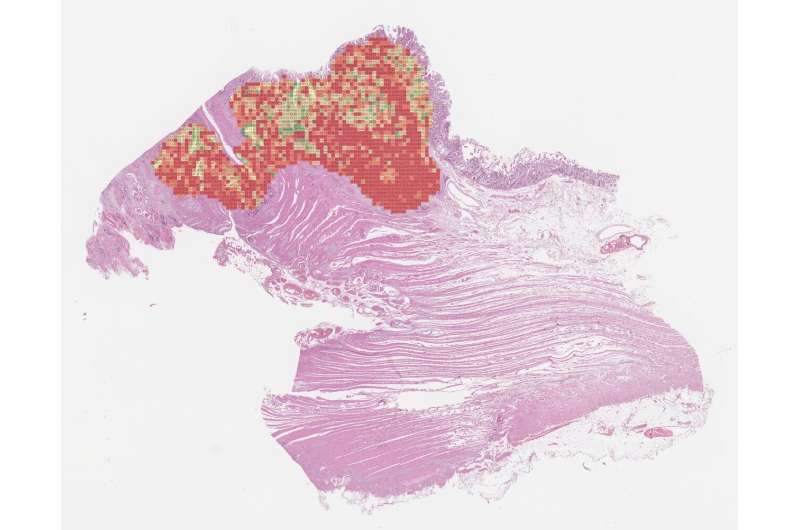AI-based marker for colon cancer can help improve quality of treatment

A Norwegian-led research group has developed a clinically useful prognostic marker using deep learning and digital scanning of conventional hematoxylin and eosin-stained tumor tissue sections. The assay has been extensively evaluated in large, independent patient populations, correlates with and outperforms established molecular and morphological prognostic markers, and gives consistent results across tumor and nodal stage.
The biomarker stratified stage II and III patients into sufficiently distinct prognostic groups. The tool has the potential to guide the selection of adjuvant treatment by avoiding therapy in very low-risk groups, and at the same time, identifying patients who would benefit from more intensive treatment regimes.
The new method, which detects the DoMore-v1-CRC marker, is called histotyping.
Validated
More than 12,000,000 image tiles from patients with a distinctly good or poor disease outcome from four cohorts were used to train a total of 10 convolutional neural networks purpose-built for classifying super-sized heterogeneous images. A prognostic biomarker integrating the 10 networks was determined using patients with a non-distinct outcome.
The researchers tested 920 patients with slides prepared in the UK, which were independently validated according to a predefined protocol in 1122 patients treated with single-agent capecitabine using slides prepared in Norway. All cohorts included only patients with resectable tumors, and a formalin-fixed, paraffin-embedded tumor tissue block available for analysis. The primary outcome was cancer-specific survival.
Eight-hundred twenty-eight patients from four cohorts had a distinct outcome and were used as a training cohort to obtain clear ground truth. 1645 patients had a non-distinct outcome and were used for tuning.
The biomarker provided a hazard ratio for poor versus good prognosis of 3·84 (95% CI 2·72–5·43; p<0·0001) in the primary analysis of the validation cohort. After adjusting for established prognostic markers significant in univariable analyses of the same cohort, (pN stage, pT stage, lymphatic invasion, venous vascular invasion) was the hazard ratio 3·04 (2·07–4·47; p<0·0001).
Reducing the number of unclear prognoses
The method can differentiate between different stages of cancer and between patients in equal stages, but with different prognoses, using deep learning and neural networks. With today's pathological methods, as many as 80% of patients end up with an unclear prognosis. With the new AI-based method, is this figure has reduced to 12%. The researchers behind the marker expect it to be a useful tool for the choice of treatment.
"The prognostic tools we have today, especially in the most common cancers, are far too coarse. We can with more precise prognostication, avoid both over- and undertreatment. Both will be important for the patient and the clinical services," says Sigbjørn Smeland, director of the Cancer Clinic, Oslo University Hospital.
More information: Ole-Johan Skrede et al. Deep learning for prediction of colorectal cancer outcome: a discovery and validation study, The Lancet (2020). DOI: 10.1016/S0140-6736(19)32998-8


















